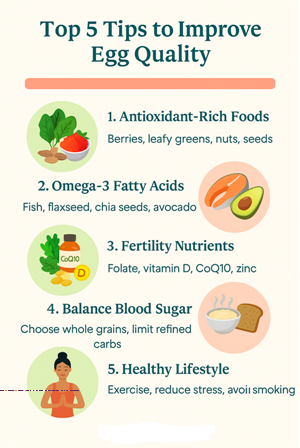When it comes to female fertility, one of the most common questions women ask is: “What do my AMH levels really mean?” AMH (Anti-Müllerian Hormone) is a hormone secreted by small ovarian follicles, and it plays an important role in indicating a woman’s ovarian reserve — the number of eggs remaining in the ovaries.
However, many women confuse AMH levels with egg quality. While AMH gives us an estimate of quantity, egg quality is influenced by multiple factors such as age, nutrition, mitochondrial energy, hormonal balance, and lifestyle. Both egg quantity and quality matter, but the good news is — you can take steps to improve the environment in which eggs develop.
What Does AMH Really Indicate?
- Higher AMH → Suggests a greater number of small follicles. Common in conditions like PCOS, though egg quality may vary.
- Normal AMH → Reflects a healthy ovarian reserve for your age.
- Low AMH → Means fewer eggs in reserve. It does not always mean infertility, but it may reduce options and response to fertility treatments like IVF.
👉 Remember: Even with low AMH, a healthy egg can still result in pregnancy. The focus should be on creating the best possible conditions for egg development.
AMH and Egg Quality – How They Are Connected
AMH = Egg Quantity: It tells us how many eggs are left, not how healthy they are.
Egg Quality = Fertility Potential: Quality depends on whether the egg has the right chromosomes, energy reserves, and ability to develop into an embryo.
Lifestyle & Nutrition Matter: The way you eat, sleep, and manage stress can impact egg quality far more than AMH alone.
Natural Ways to Improve Egg Quality and Support AMH
1. Antioxidant-Rich Foods
Free radicals can damage eggs during their maturation. Eating foods high in antioxidants helps protect ovarian cells.
- Blueberries, strawberries, and pomegranates
- Leafy greens like spinach, kale, and moringa
- Nuts and seeds (almonds, walnuts, sunflower seeds)
- Bright-colored vegetables (carrots, beetroot, bell peppers)
2. Omega-3 Fatty Acids for Hormonal Balance
Omega-3s improve cell membrane health and reduce inflammation in the ovaries.
- Oily fish like salmon, sardines, mackerel
- Plant sources: flaxseeds, chia seeds, walnuts
- Olive oil and avocado as healthy fat options
3. Fertility Nutrients That Make a Difference
| Nutrient | Role in Fertility | Natural Sources |
|---|---|---|
| Folate (B9) | Supports DNA formation in eggs | Leafy greens, beans, citrus fruits |
| Vitamin D | Balances hormones and supports ovarian function | Sunlight, fortified foods, mushrooms |
| Coenzyme Q10 (CoQ10) | Fuels egg mitochondria, improves energy | Fish, meat, supplements (if prescribed) |
| Zinc & Selenium | Protect against oxidative stress | Nuts, seeds, whole grains, seafood |
4. Balance Insulin and Blood Sugar
Women with insulin resistance or PCOS often struggle with egg quality. To balance insulin:
- Prefer whole grains (brown rice, millets, oats)
- Limit sugar, white bread, and processed carbs
- Eat smaller, frequent meals to avoid sugar spikes
5. Lifestyle Choices That Improve Egg Health
- Exercise moderately: Yoga, swimming, or brisk walking increase blood flow to the ovaries.
- Reduce stress: Meditation, deep breathing, and acupuncture can help lower cortisol, which disrupts ovulation.
- Avoid toxins: Quit smoking, reduce alcohol, and stay away from BPA plastics and pesticides.
- Sleep well: 7–8 hours of quality sleep supports hormonal repair.
How Long Does It Take to See Results?
Eggs take almost 90 days to mature before ovulation. This means the changes you make today — in diet, supplements, and lifestyle — will start showing benefits in about 4 to 8 months. Consistency is the key.
Sample Fertility-Friendly Meal Plan
| Time | Example Meal |
|---|---|
| Breakfast | Oats with berries + boiled egg + green tea |
| Mid-morning | Seasonal fruit + handful of walnuts |
| Lunch | Brown rice + dal / grilled fish + vegetable salad |
| Evening | Yogurt with chia seeds or hummus with carrots |
| Dinner | Stir-fried vegetables + tofu or chicken |
| Bedtime | Herbal tea or warm milk with turmeric |
Final Takeaway
Your AMH level is an important fertility marker, but it does not define your fertility completely. Even women with low AMH can conceive naturally or with assisted methods if egg quality is supported.
By focusing on a nutrient-rich diet, balanced lifestyle, and reducing stress, you can create the right conditions for healthy eggs. The combination of good egg quality + the best possible environment gives you the highest chance of conception.


